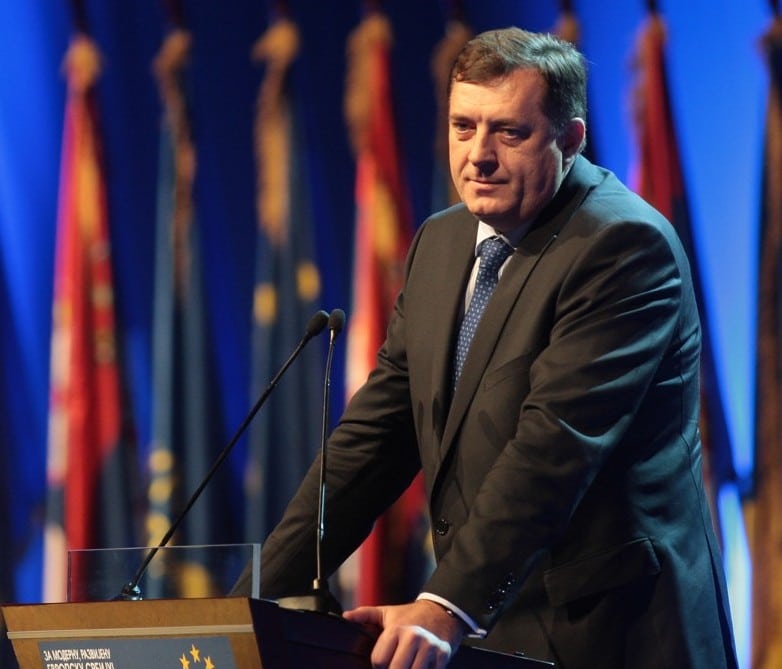Photo: Wikimedia Commons
In recent months, actions of Milorad Dodik, the Bosnian Serb leader, have shown alarming signs of separatism, political repression, and anti-constitutionality. This article examines the disturbing current affairs happening in Bosnia and Herzegovina.
Who is Milorad Dodik?
Since November 2022, Milorad Dodik has been the President of Republika Srpska, which is one of the two highly politically autonomous entities of Bosnia and Herzegovina. He has been in power for over 25 years through various governing positions. Dodik, who is one of Putin’s key European allies, is known for his hardline Serb nationalism, pro-Russian politics, separatism, and West-defying rhetoric. He has explicitly stated that he wishes that “Serbia and Republika Srpska become a joint state one day” and has threatened to declare the Republika Srpska independent from the rest of Bosnia.
His anti-constitutional politics are also negatively affecting minorities: in April, he announced an anti-LGBTQI+-law, to ‘protect traditional family values’. Because of the destabilisation Dodik brings to the territorial integrity and democratic values of Bosnia and Herzegovina, he has been under US sanctions for over a year. In addition, Bosnia’s top court has tried restraining him by repeatedly repealing his parliament’s laws.
Dodik and the Dayton Agreement
The Dayton Agreement, also known as ‘General Framework Agreement For Peace in Bosnia and Herzegovina’ was established in 1995 to end the Bosnian war by adopting a consociational power-sharing approach through splitting the country into the Federation of Bosnia and Herzegovina and the Republika Srpska, connected through a weak central government. As a result of the agreement, Bosnia and Herzegovina established an informal protectorate with certain aspects of influence from neighbouring Croatia and Serbia. This arrangement granted significant authority to the High Representative for Bosnia and Herzegovina, an international position appointed by the United Nations, to oversee the implementation of the agreement. Dodik aims to dismantle this international oversight. He most specifically antagonises international judges at the constitutional court, but has also made Republika Srpska cut all ties with the UK and US embassies in Bosnia.
Tensions between Dodik and the Constitutional Court
As a result of Dodik’s separatism, on the 27th of June 2023, Republika Srpska’s parliament passed the ‘Law on the Non-application of Decisions of the BiH Constitutional Court’. This law implies that the Constitutional Court of Bosnia and Herzegovina’s decisions will not be implemented in Republika Srpska.
Christian Schmidt, the High Representative of the International Community for Bosnia and Herzegovina, responded a day later, announcing that he will not accept Dodik leading Republika Srpska into isolation and that he will try to counter his actions. The US Embassy to Bosnia and Herzegovina also responded by tweeting that “The Republika Srpska National Assembly carried out a reckless attack on the Dayton Peace Agreement and the BiH Constitution it established by adopting the Law on the Non-Enforcement of Decisions of the Constitutional Court of BiH”.
Eventually, on the 1st of July, Schmidt repealed the law and implemented changes to the Criminal Code of Bosnia and Herzegovina, in order for it to treat acts that are violating the constitutional order of the state as a criminal offence. Furthermore, Schmidt urged international partners to collaborate on implementing sanctions against those who disregard the Dayton Agreement. He also emphasised that entity assemblies lack the authority of state institutions.
The day after, on the 2nd of July, Dodik further escalated the situation by announcing that his parliament would not accept the decisions of the Prosecutor’s Office of Bosnia and Herzegovina, the Court of Bosnia and Herzegovina, and SIPA. Through Twitter, he also called for a referendum on the secession of Republika Srpska. His reasoning: “What Christian Schmidt did yesterday is nothing more than part of a well-designed plan to discipline Republika Srpska, to make its president a monster, an unreasonable person, a man who cannot be talked to, and all of this is supported by the EU in the form of Johannes Sattler” In addition, said that Schmidt, whose decisions would be disregarded with Dodik’s new laws, is a “false high representative” and that Republika Srpska will leave BiH if forced by Sarajevo.
With these actions, there has been growing unanimity among Western countries about the fact that Dodik has gone too far and needs to be punished with more serious sanctions. The EU fears that Dodik’s acts might harm Bosnia’s efforts to join the EU. Leading MEP’s, including the European Parliament’s chairman of the Committee on Foreign Affairs, have even issued a statement on the 5th of July, saying that the EU should, like the US and the UK, quickly impose sanctions on Dodik, arguing that “the EU’s credibility is at stake”.
Dodik recriminalising libel
On the 20th of July, Dodik decided to further worsen tensions by having the Bosnian Serb parliament pass a law which recriminalises libel. This law, which Dodik himself championed, may severely threaten free speech, restrict freedom of expression, and silence media and opposition. Furthermore, the fines for libel are extraordinarily high. The Transparency International group in Bosnia reacted by saying that “the authorities in Republika Srpska [have] entered a phase of open repression over the citizens and [have] joined the worst authoritarian regimes in this part of the world”. Bosnian Serb journalists have been responding by organising numerous protests.
The recent trends of Dodik and his allies in Republika Srpska and Serbia do not only severely undermine values of democracy, peace, and constitutionality, but also spark severe concerns over Bosnia possibly fracturing along ethnic lines, only 28 years after the devastating Bosnian war, in which more than 100,000 people were killed, ended. These concerns call for the West to implement a powerful diplomatic strategy to safeguard the peace and security of Bosnia.
Written by Luna Sent



